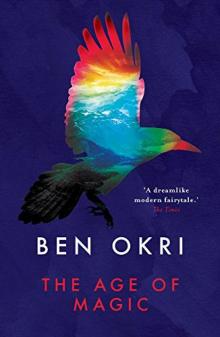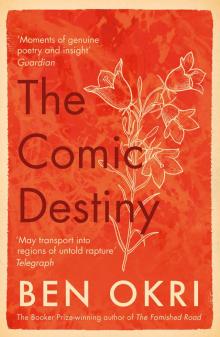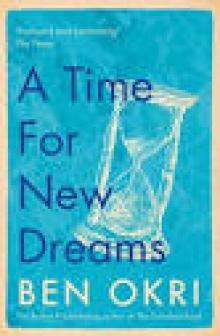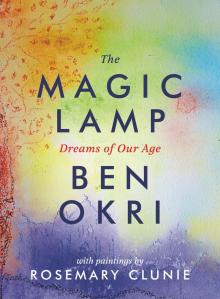In Arcadia Read online
Page 8
‘What is it?’
‘When the horse was out of sight of the crab, it stopped and wondered why it didn’t run sideways like the crab. The horse had often secretly admired this ability in the crustacean. And so the horse, making sure that no one was around to witness its folly, practised trotting sideways. The horse found it very difficult at first, then increasingly pleasurable, and refreshingly novel. Over the next few weeks the horse kept up this practice till it mastered the art of running sideways as much as it was possible for a horse to do. And then came the day of the great games and festivities of the horses. And in the games the horse astounded all the other horses with its elusive capacity, its ability to escape capture by being able, very swiftly, to run sideways, to change direction effortlessly and without thinking about it. And so it became the most accomplished and mysterious horse among all the horses. Many years later, when it had long been acclaimed as the greatest of all the horses, after it had become a legend in its own horse-time, when this great horse was dying, its children gathered round and asked the secret of its longevity, success, and enormous influence. The horse said: “I befriended all the large and little creatures, and learned from them. In one word, I seemed perverse.” The children laughed and were amazed. And when the great horse asked why they were amazed the children said: “We met the greatest and most fascinating crab, profoundly revered by its people and many others. And when we asked the secret of its great life the crab said more or less the same thing as you.” The great horse smiled and said: “Then it must be the only crab that knows how to run straight as well as sideways, and also how to gallop. What we sometimes call perversity, my children, is really genius at work.” “And what is genius, father?” the children asked. “Common sense raised to the highest,” the old horse replied. And then he expired. That is the end of my improvisation.’
18
Mistletoe stared at him again. Then she resumed drawing, and was silent for a while. They listened to the train’s whistle, as they shot past the golden countryside. Then Mistletoe, in a gentle voice, said:
‘You really ought to write that down too. Shame to just waste it on me.’
And Lao, as if anticipating her remark, said:
‘I waste good things that I might find excellent things. Don’t you think we should try and go beyond ourselves?’
‘Yes, but only if we have made good use of what we’ve been given.’
‘Nature is spendthrift. Look at the trees in autumn, shedding all those leaves. Look at the way plants and trees and flowers scatter their pollen on the wind, not caring where it goes…’
‘But trusting that a few of those seeds will fall on good soil, and grow.’
‘But such generosity, Mistletoe, such hurling out of so many millions of seeds so that only one or two will grow. What extravagance! And yet see how nature remains, see how abundant, how winter bares her of leaves, makes her stark, how she doesn’t complain or fight or apologise or panic. But she grows inwardly, gathering in silence and in secret all the sap for the new season. She prepares meticulously, within the castle of her bark. Nature knows no defeat. Trees and plants are not conquered by winter. They wait. They prepare. They work with winter. They work round winter. They probably like winter. They probably need winter’s victory. It gives them time to prepare the next stage of their growth and evolution. In the same way the generosity of trees is not foolishness, or folly, or indiscrimination, but greatness, nature’s highest economy. Maybe the vast production of seeds is a fabulous inner incentive for growth, for greater outward reach and deeper grip on the earth. Maybe trees are more powerfully motivated and become more awesome, more durable, because they produce so much seed. After all, it wouldn’t need so much nourishment and become so much if it merely produced the exact number of seeds or pollen required to propagate the next generation. If this number was say ten or twenty, then the whole tree might not do such deep work inside itself, such great thickening of its trunk, such profound exploration with its roots, such vast spanning with its branches, such upward reach. You can’t have greatness without abundance.’
‘But,’ said Mistletoe, ‘trees are not great because they produce such vast number of seeds or pollen. Otherwise, when they no longer…’
‘Oak trees, thousands of years old, still produce seeds: nature is always generative, always productive. There can be no greatness without productivity, of one kind or another.’
‘But for some that greatness is producing pollen, for others shade. For some it is sheer endurance…’
‘The last resort of the mediocre…’
‘…for others it is sheer concentration. Titian had genius and endurance. Raphael had genius and concentration.’
‘But they are both productive. Titian produced a lot. Raphael continues to inspire production, and so he produces through others, through time, much like Mozart.’
‘So you agree then that there are different kinds of generosity. There’s the generosity of pouring out plenty of potentialities; and there’s the generosity of having vast potentialities in the few things given out. One is quantity, the other quality.’
‘You’ve moved to the other side of the argument. You’re now on my side.’
‘No, I’m not.’
‘Yes, you are.’
‘I’m not.’
‘I pour out what’s at the top to get to what’s at the bottom. I’m interested only in the essentials, the most intangible things. To find them I have to get rid of so much dross, so much fine rubbish, so much froth. I have to get rid of all my thoughts, opinions, perceptions. They are not important, and can be had by anybody, or will be, or variations of them can occur to anybody. No, Mistle, I’m not interested in me. I’m interested in what’s not me that’s within me. I’m interested in getting to the things in me that’re beyond me, beyond speech, but which can be refracted in words, or channelled through words, or like light be made at least to illuminate a room or house or world through the transparency of the windows, or the lovely coloured glass of art. I get rid of so much of myself in order to let the light come through.’
‘You can do that more economically.’
‘How?’
‘Through silence.’
19
Lao was jolted by that word – silence. It seemed to open up to him, in a landscape-flash, briefly, what his journey was truly about. The word knocked out something in his mind; and in a perfect stillness, which he had been unaccustomed to for a long time, he gazed into a warm and lighted inner realm as his eyes looked out into a brilliantly lit landscape of rocks, flowers, distant churches, high roads, and barley fields. His mind was in a place of sweetness unknown to him. From every pore, without knowing how, he drank in the lovely liquid of that state. He had a half-cynical smile on his face, the kind of smile that doubters have when they are being inwardly stirred, inwardly touched by the very thing they doubt. It was a smile both of resistance and submission, of denial and delight, of the spirit knowing a thing to be true and of the head still refusing to accept it as true.
‘Even if we don’t believe in it, we need the Arcadian dream,’ Lao said suddenly. ‘If only as a place where the spirit can rest. In life the body can have many holidays, but the spirit has so few. The body’s holidays are simple: sex, sun, beach, sea, sleep. But the spirit’s holidays are rarer: they are ideas, inspiration, Arcadias. The holidays of the spirit are more important than those of the body. The body has lots of holidays while it’s alive, and a long one when dead. The spirit has few holidays when in life. The holiday of the spirit replenishes civilisations, makes spiritual evolution effortless, and makes it possible for us to go up to the higher levels that we despair of reaching. Holidays of the spirit help us assimilate faster and more thoroughly all that we are and have been, they help the inner distillation, and they make us grow faster, greater and more organically. Holidays of the spirit are what bring about our true transformation from chrysalis to butterfly, from weakness to wisdom, from saplinghood to strength. We n
eed Arcadia, for without it we will die of our neuroses.’
Then suddenly Lao stood up and went in search of Jim, for he had been faintly touched, in his core, for the first time, by the mysterious nature of what he had thought was a truly bad idea for a televised journey.
20
But when he found Jim he encountered not a director in control, but one falling out of control. Not a man at ease, but a man ill at ease. A man disintegrating, collapsing, staring into an abyss, into his final failure. Jim was in a deep funk, a stinking malaise, with his eyes large and unfocused, as if he had already surrendered his soul to the sweet god of despair. Lao found a man who was all but finished. Jim didn’t move when Lao touched him on the shoulder. A dead zone surrounded him. Lao sat down opposite Jim, and stared out of the window. He gazed at the tapestry of the passing world. Only the deep can talk to the deep. The deep calls forth the deep. Only those who know deep despair can talk to the deeply despairing. Lao said:
‘Let me tell you the secret of the butterfly.’
But before he could begin, Jim looked out of the window, as if he were contemplating jumping. Then he turned his mournful woebegone face back towards Lao, ran his fingers through the few scattered tufts of white hair he had left and, in the gloomiest voice, said:
‘It’s all falling apart, old boy. I can’t cope. I’m a mess. I’m a scarecrow, except not even the crows are scared any more. It’s all falling to pieces. My hair is falling out in clumps. It’s embarrassing. The stuffing is coming out of me. The weave is coming undone. The straw is falling off my head, sticking out of my ears, old boy. If it weren’t so abject it would be comic. I can say this to you because you’re a mess too, but you’re an artistic mess, and in a strange way you hang together. I can talk to you because you’re authentic and wouldn’t give me any bullshit about things being all right and the human spirit can overcome and stuff like that, stuff that makes a man want to cut his throat because he simply can’t find it in him to overcome and be so damned positive. I’m swimming in failure. I’m drowning in the stuff. I’m fucked. No redemption or atonement for me. I’m the bathwater that God threw out. Failure behind me, failure in front of me, failure all the way up to my eyeballs. I stink of the stuff. All my life I’ve let everyone down. My kids can’t look up to me and have taken to joking about what a bad film-maker I am. Made the worst films in history. Got the vote for it twice. Twice voted the worst film maker of the year. When did I last make a film anyway? You must have been in nappies then. I tell you, Lao, someone has set me up, they’ve set me up for the final fall. They’ve stitched me up. This is curtains, I can smell it. The last act in a non-career. Began by being bad and died at his worst. The best thing that can happen is if I die on this journey, mid filming. That way there’s no last act, no last film, only mid-film. Then you guys can carry on, make the film to the end, make it to the best of your ability, and if it’s any good they’ll say that Jim inspired an inspired movie at the end. They’ll speak of my magnificent swan song. I’ll be redeemed. That’s my Arcadia, if you really want to know. To make one good film. To die in the odour of excellence. A great last act. Something for the chaps in the back seats. A good man comes through at the last. Never write a man off till you’ve heard his last song. His life was crap, but at the end he was inspired. My father didn’t manage it. Lived in failure, died in failure. Not a shred of excellence anywhere. Wasn’t even mediocre. He distrusted, he loathed excellence. A walking failure. He made failure into a mythology. Then he sold us on it. Haven’t been able to shake his shadow since. Haven’t even been able to react against him. It would be too much like betrayal. And to betray his failure would be the ultimate, it would be to judge the poor sod. I never stood a chance. Never got a foot in. Why are you all on this journey with me anyway? I’m a mess. I inspire no confidence. You guys and ladies are great; it’s me that’s all wrong, I’m the fraud, can’t you smell it? There are things going on in this journey that I don’t understand. Why me? Why flog a dead horse? Why humiliate the humiliated? Why saddle me with such a film concept when everyone knows I don’t stand a chance in hell of delivering? They knew I’d make a mess of it, so why did they choose me? Is this a company joke? I tell you, I’m the least equipped person to make a journey to Arcadia, to notions of earthly paradise. I’m better equipped to lead folks on a journey to hell, to the inferno, the worst bingo club in the world… I’ve got hell in me. Chaos is crawling out of every pore… and who is this sinister Malasso that we’re dealing with anyway, shaping our journey? Are we going to hell or what? Are we all going to be slaughtered or what? I can smell something weird in all this. I can’t hold all this together… my wife has just left me, my kids revile me, I’m the great joke of the industry, I’m up to my last hair in debt, my house is about to be repossessed, and here I am, bleating on and on to you… the best that can happen, I tell you Lao, is if I die on the journey… then I want you to take over, carry on without me, go on to the end, don’t stop to give me a funeral, just make a good film for me, and stick my name on it along with yours. I want to die in Arcadia, in my own Arcadia, and that’s making a good film. I want to die in my dream. The reality is too dreadful. So promise me, Lao, promise me that you will all get to Arcadia, that you will make a film worthy of the death of a poor wretch like me. Just promise me this, and I’ll perk up, and I won’t bother you anymore, and not a word of despair will I breathe again, because I’ll be content about my end. Will you promise me this, Lao?’
21
Lao calmly heard him out, and without altering his expression one bit, an expression which had been neutral, with his eyes cool, his face fixed and still, his breathing unchanged, he said:
‘Let me tell you the secret of the butterfly. The beauty of the butterfly’s wings is a disguise, a secret language. To us they are just beautiful, but they conceal another purpose. They are used to communicate with other butterflies. The patterns on the wings communicate one thing to us, and another thing to other butterflies. But there is no deceit involved. We see the world in colour. Butterflies see the world in ultra-violet. The striations and patterns, seen through the eyes of a butterfly, consist of different intensities of blue. To the male butterfly, intense blues suggest an invitation for fertilisation. God knows what else they read as scripts or inscriptions on one another’s wing patterns. They may communicate a whole range of things, personal disposition, nearness of danger, an entire alphabet of moods. We don’t yet know how vast is this secret communication between butterflies, this secret speech. That is what art is. It’s the hidden speaking to the hidden. All art is a secret language, a double language. And it does something other than what it appears to be doing. Sometimes it is effecting a secret cure on our spirit while being coruscating on the outside. Art has a sphinx-like quality, a faintly sinister quality. The sinister intelligence of the double function. Art is the ultimate spy. And you know that’s what our journey is. It has many secret languages, and secret purposes. And we’ll discover them as we go along. And we’ll fail often on the way. I don’t mind failure; it’s something to get past on the way to greatness.’
22
When Lao finished with his little speech Jim stared at him with puzzlement on his face. They were both silent as the train wove its way past French towns, landscapes, houses, blue fields, over bridges, across yellow countryside. Husk brought the news that there had been a suicide attempt on the train. It caused considerable alarm among the passengers. A strange gloomy energy circulated the carriages as the word was passed on, bringing dismay and bewilderment in its wake. A suicide attempt? How? What could have caused it? Was it a man or a woman? The gender changed several times. Sometimes it was a man, sometimes a woman. Sometimes it was a member of the film crew. Other times it was a member of a business delegation.
Jim wanted to find the crew, to locate everyone and make sure they were all fine. The whole team was rounded up and accounted for, except Riley. She could not be found. Anxiety turned to alarm. The train staff were contacted;
announcements were made over the train speakers. There was no response from Riley. The crew split up, and began a thorough search of the train. They searched the second class carriages, the toilets, the staff rest rooms, the baggage compartments, and they even extended their search to the train driver’s cubicle. It seemed that Riley had disappeared.
The team sat down together disconsolately. Jim said:
‘Who saw her last?’
‘She was with me,’ said Sam, ‘loading the film camera as usual. She went off with one of the cases, and that was the last time I saw her.’
‘What was her mood like?’
‘Mood? Mood? What do you mean mood? I wasn’t aware of her mood. I was taking tricky shots of faces, shots of the countryside at an angle through the window. She’s supposed to be my assistant, not to have moods.’
‘I think she’s been a bit depressed,’ said Husk.
‘A bit depressed?’ cried Jute. ‘She’s been manically depressed!’
‘Well, how did none of us notice?’ asked Jim.
‘Some of us did,’ Jute replied.
‘What’s been wrong with her?’
‘Everything…’
‘So where can she have got to? There’s nowhere we haven’t looked. And she can’t have jumped off the train because it’s impossible to open any doors or windows. So she must still be on the train,’ Jim said.
‘We’ve looked everywhere…’
‘She could be in someone’s suitcase,’ suggested Propr.
Everyone turned to look at him.
‘Anything’s possible,’ he added, defending himself.
‘Who attempted suicide?’
Now everyone turned to stare at Jute. Then it became clear that no one knew. They became silent as they contemplated the possibility that Riley had attempted to take her own life. They thought about her life in abstract terms, trying to puzzle out motives, reasons, secret distresses, troubles, and to reconcile this with her apparently sunny and chirpy nature.

 The Age of Magic
The Age of Magic Infinite Riches
Infinite Riches Songs of Enchantment
Songs of Enchantment Tales of Freedom
Tales of Freedom Dangerous Love
Dangerous Love Starbook
Starbook The Famished Road
The Famished Road Astonishing the Gods
Astonishing the Gods A Fire in My Head
A Fire in My Head The Freedom Artist
The Freedom Artist The Comic Destiny
The Comic Destiny A Way of Being Free
A Way of Being Free Prayer for the Living
Prayer for the Living A Time for New Dreams
A Time for New Dreams The Magic Lamp
The Magic Lamp In Arcadia
In Arcadia